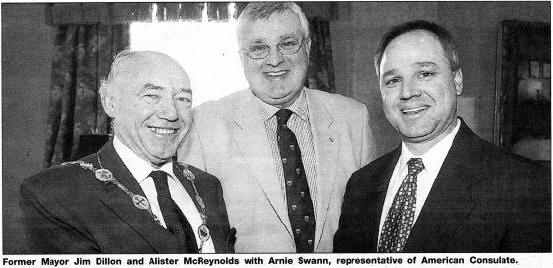
VISIT RECALLS EXPLOITS OF FORMER LISBURN MAN
Lisburn's special relationship with the Garden City

UNTIL relatively recently few people on this side of the Atlantic were aware of the special connection between Lisburn and the famous Garden City in Long Island, New York.
The connection was founded some 130 years ago thanks to Alexander Turney Stewart, who was born and brought up" in Lisburn and eventually went on to become one of America's most successful businessmen.
Stewart's success came after he i m p o r t e d Lisburn's world-renowned linen to the United States and created the world's first department store in the heart of New York.
Later in life Stewart went on to found Garden City in 1869, an affluent area just a short distance from the bustling heart of New York.
In an effort to cement Lisburn's links with Garden City, Lisburn's Mayor, Councillor Jim Dillon, and the director of Lisburn Institute, Dr. Alister McReynolds, visited New York earlier this month.
Both were guest speakers at Garden City Chamber of Commerce's finale luncheon. They also participated in several events including the Belmont Festival, the running of the Belmont Stakes and the Chamber and Historical Society's annual garden party. Lisburn City Council is determined to strengthen links with Garden City. The council is investigating twinning possibilities and plans to erect a head and shoulders bust of Alexander Stewart at the Island Civic Centre.
Life
During his speech in Garden City, Dr. McReynolds chartered Stewart's early life following his birth in Lissue in 1801.
Stewart's father died when he was an infant and he was brought up by his uncle. After emigrating to New York he came into money through the family farm at Lissue Road and he returned to the area to collect it.
Upon returning to New York he set up his own business in drapery and clothing and established the first department store in the world. The store was described as being more like a 'palace' and Stewart's reputation grew worldwide.
Despite his enormous successes, Lisburn was never far from the merchant's mind. The outbreak of the American Civil War meant supplies of cotton from the American confederate states were cut off from Europe.
The impact on the Maze, Broomhedge and Lissue areas was greater than anywhere else in Europe. When Stewart heard of the crisis he sent two shiploads of food to Belfast. The grain was sold and the money used to feed the people of Magheragall and Lissue.
Up to 110 people from the area were also transported to New York and given jobs and money.
Mr. Dillon marvelled at Stewart's generosity. "What strikes me most about this man is his sense of community spirit and his mutual respect for both his birthplace and his adoptive home. He never forgot where he came from as well as embracing his new life in America," he said.
It was later in life that Stewart bought the area of land in Long Island that was, to become Garden City. The design of what became a `utopian living environment' was founded during the first 17 years of Stewart's life.
Stewart always had a close association with the James Richardson family who later designed Quaker towns including Bessbrook in South Armagh in 1845.
In Bessbrook large squares were built around with a butcher's shop, a dairy, a dispensary, educational facilities, a savings bank, a village hall and several churches.
Stewart had maintained his close links with the Richardson's and the experimental concept used to design Bessbrook and other villages in the 1800's was used in New York's Garden City.
The area was further distinguished by the construction of a beautiful cathedral and school in Stewart's memory by his wife.
Mr. Dillon and Dr. McReynolds are delighted with the links that have been established and there seems little doubt that they will be strengthened in the near future.
Mr. Dillon wants to see bi-annual visits to the respective areas and student exchanges are being organised for 2003 between colleges in Garden City and Lisburn Institute and the University of Ulster.
"They were very nice people and they extended more than a hand of friendship to us," added Mr. Dillon. The Mayor predicted a twinning arrangement would lead to 'real benefits' for both Lisburn and Garden City.
Dr. McReynolds also wants to ensure more people become aware of the special links between the two places. "They know more about Lisburn than we do about them and that's something we want, to change. I think in places like Lisburn people are starting to become more aware of their cultural heritage and of people who have achieved great things."
Mr. Dillon is certainly sure of one thing - both Lisburn and Garden City owe a huge debt of gratitude to Alexander Stewart.
